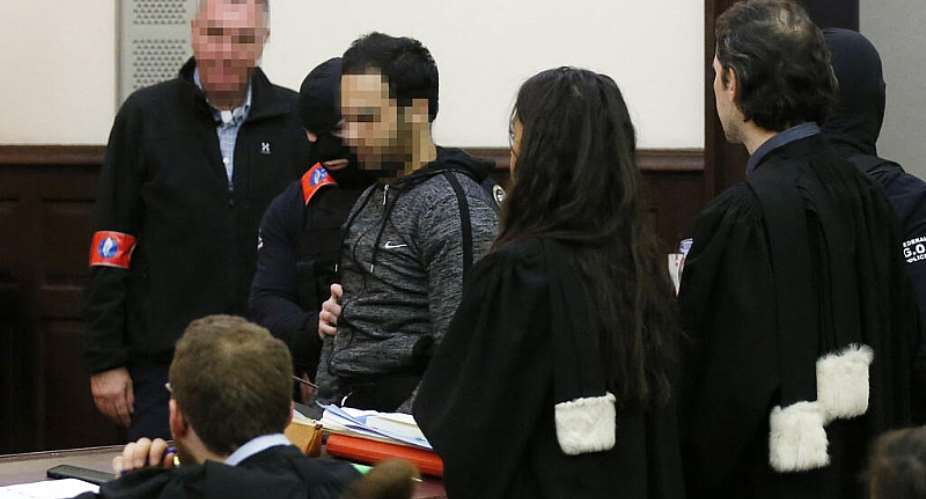Sofien Ayari is not an easy man to defend. He fought in the ranks of Islamic State in Syria, he was involved in a shootout with Belgian police, he has generally refused to speak at this trial. On Wednesday, Ayari's legal team did the best they could.
Sofien Ayari was not in Paris on the night of the November 2015 attacks. He was in a bus on his way back from Schiphol airport near Amsterdam, with Osama Krayem, another of the accused.
Despite his absence, Ayari risks spending 30 years in jail on charges of complicity in a terrorist plot.
The prosecution is convinced the two men, both battle-hardened Islamic State heroes, were in one of Europe's busiest airports with a view to carrying out a terrorist attack in parallel to the Paris killings.
But the prosecution has no proof.
That fact was underlined several times by Maître Ilyacine Maallaoui, speaking in defence of Ayari.
The enormous vacuum of evidence
"They were going to perpetrate a mass killing? Where are the weapons? Where are the explosives? Where are the phone links which show the existence of a Schiphol group? There is no video, no security footage, no DNA evidence, nothing.
"And that makes my client a terrorist accomplice?
"He went to Syria. Does that make him an accomplice? No.
"The prosecution case is an enormous vacuum based on feelings, assumptions. It is not law but judicial impressionism.
"To be an accomplice, you have to do something. You either take part in a crime, or you help to prepare for it.
"They did nothing and the prosecution has decided to call that complicity."
Referring to the fact that Ayari and Krayem travelled from Belgium to Schiphol on one-way bus tickets, Maître Maallaoui said "they bought one-way tickets to life imprisonment".
"You will not find my client guilty of complicity," Maître Maallaoui concluded, directly addressing the tribunal. "Not because I ask it but because you can't make a case out of thin air."
Terrorist crime in a time of war
Sofien Ayari's defence was then taken up by Maître Isa Gultaslar.
He chose to focus on the horrors of the Syrian war, describing "the barbarity, the terrorist cruelty" of the Syrian state.
"We have to distinguish between terrorism in war, and terrorism in peacetime," Gultaslar continued.
"Syria was a war zone. The militants involved were thus combatants subject to international military law.
"If you accept that Monsieur Ayari was a member of Islamic State, which is the case. Then, under the terms of the legal principles which I have outlined, the acts committed in Paris must be regarded as war crimes.
"And did Monsieur Ayari personally participate in the war crimes committed in Paris?
"The answer is no, he did not!"
The trial continues.





 Ejisu by-election: Aduomi warns NPP against voter intimidation
Ejisu by-election: Aduomi warns NPP against voter intimidation
 High Court orders implicated four NDA officials to present defence
High Court orders implicated four NDA officials to present defence
 Let’s all be matured, patriotic to have a peaceful election this year – Dampare ...
Let’s all be matured, patriotic to have a peaceful election this year – Dampare ...
 Mahama's administration saw thievery that knew no bounds; stole from market wome...
Mahama's administration saw thievery that knew no bounds; stole from market wome...
 GRA/SML deal: Always read the stories behind the headlines or you'd look stupid ...
GRA/SML deal: Always read the stories behind the headlines or you'd look stupid ...
 GRA/SML Contract: It takes some 'wild' boldness for a president to make this dec...
GRA/SML Contract: It takes some 'wild' boldness for a president to make this dec...
 Elisu By-election: "If you call yourself a man, boo Chairman Wontumi again" — Bo...
Elisu By-election: "If you call yourself a man, boo Chairman Wontumi again" — Bo...
 Fuel tanker driver escapes with his life after tanker goes up in flames near Suh...
Fuel tanker driver escapes with his life after tanker goes up in flames near Suh...
 Uniform change: ‘Blue and white are brighter colours’ — Kwasi Kwarteng explains ...
Uniform change: ‘Blue and white are brighter colours’ — Kwasi Kwarteng explains ...
 MoE not changing all public basic school uniforms but only newly built ones — Kw...
MoE not changing all public basic school uniforms but only newly built ones — Kw...
